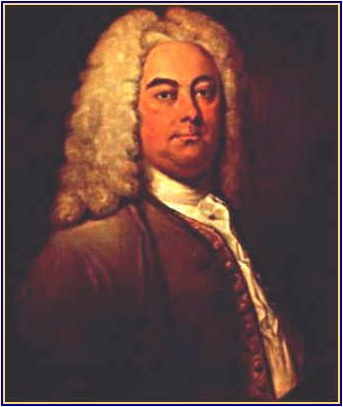In Celebration of the Human Voice - The Essential Musical Instrument
Home | Doo Wop | Barbershop | World | Contemporary | Christian | Vocal Jazz | Choral | Christmas | Instructional | Arrangements
Classical | Opera | Musicals | Personality | Young Singers | Disney | Videos | Songs | The Artists

George Frideric Handel Biography

Click Here for Sheet Music and Songbook Vocal Arrangements
Handel was born February 24, 1685, in Halle, Germany, to a family of no musical distinction. His own musical talent, however, manifested itself so clearly that before his tenth birthday he began to receive, from a local organist, the only formal musical instruction he would ever have. Although his first job, beginning just after his 17th birthday, was as church organist in Halle, Handel's musical predilections lay elsewhere. Thus, in 1703 he traveled to Hamburg, the operatic center of Germany; here, in 1704, he composed his own first opera, Almira, which achieved great success the following year. Once again, however, Handel soon felt the urge to move on, and his inclinations led him to Italy, the birthplace of operatic style. He stopped first at Florence in the autumn of 1706. In the spring and summer of 1707 and 1708 he traveled to Rome, enjoying the patronage of both the nobility and the clergy, and in the late spring of 1707 he made an additional short trip to Naples. In Italy Handel composed operas, oratorios, and many small secular cantatas; he ended his Italian sojourn with the spectacular success of his fifth opera, Agrippina (1709), in Venice. Handel left Italy for a job as court composer and conductor in Hannover, Germany, where he arrived in the spring of 1710. As had been the case in Halle, however, he did not hold this job for long. By the end of 1710 Handel had left for London, where with Rinaldo (1711), he once again scored an operatic triumph. After returning to Hannover he was granted permission for a second, short trip to London, from which, however, he never returned. Handel was forced to face his truancy when in 1714 the elector at Hannover, his former employer, became King George I of England. The reconciliation of these two men may well have occurred, as has often been said, during a royal party on the River Thames in 1717, during which the F major suite from Handel's Water Music was probably played. Under the patronage of the duke of Chandos, he composed his oratorio Esther and the 11 Chandos anthems for choir and string orchestra (1717-1720). By 1719 Handel had won the support of the king to start the Royal Academy of Music for performances of opera, which presented some of Handel's greatest operas: Radamisto (1720), Giulio Cesare (1724), Tamerlano (1724), and Rodelinda (1725). In 1727 Handel became a naturalized British subject; in 1728 the academy collapsed. He formed a new company the following year. Forced to move to another theater by the Opera of the Nobility, a rival company, in 1734, he continued to produce opera until 1737, when both houses failed. Handel suffered a stroke and retired to Aachen (Aix-la-Chapelle) to recuperate. |
Select a Category |
Want to Sing? - Find a Chorus Near You
List of Choruses by State | List of Choruses by City
